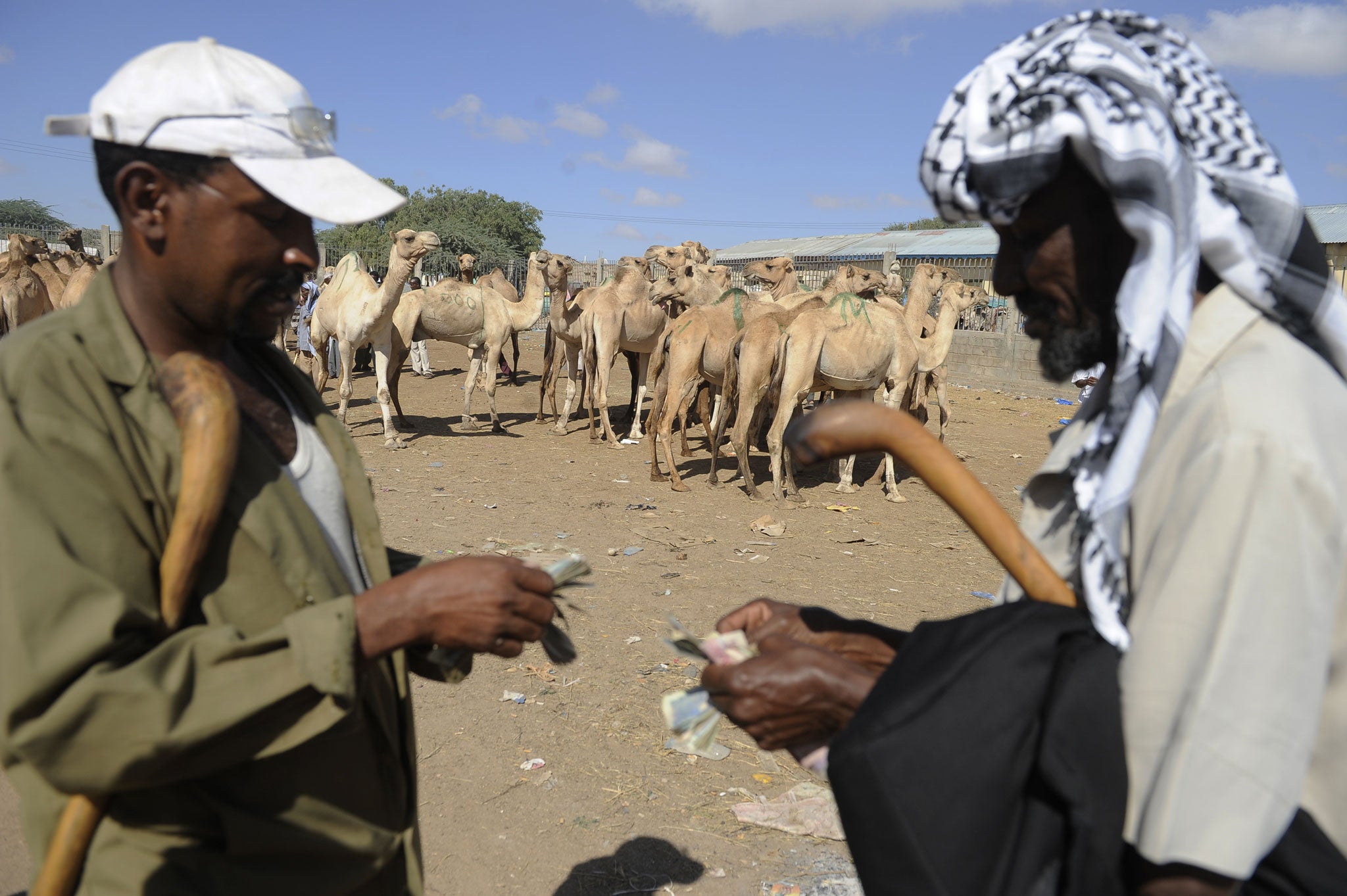For the sake of Somalia, Barclays must not close its money transfer system
To do so could herald a humanitarian crisis in the long-suffering region

Your support helps us to tell the story
From reproductive rights to climate change to Big Tech, The Independent is on the ground when the story is developing. Whether it's investigating the financials of Elon Musk's pro-Trump PAC or producing our latest documentary, 'The A Word', which shines a light on the American women fighting for reproductive rights, we know how important it is to parse out the facts from the messaging.
At such a critical moment in US history, we need reporters on the ground. Your donation allows us to keep sending journalists to speak to both sides of the story.
The Independent is trusted by Americans across the entire political spectrum. And unlike many other quality news outlets, we choose not to lock Americans out of our reporting and analysis with paywalls. We believe quality journalism should be available to everyone, paid for by those who can afford it.
Your support makes all the difference.The Horn of Africa is no stranger to hardship. Four droughts and crises have struck during the last decade, with over a quarter of a million people thought to have died during the famine in 2011. When images of suffering and despair appeared on our television screens, the British people responded with characteristic generosity – tens of millions of pounds were raised by the Disasters Emergency Committee in a matter of weeks.
So why is one of Britain’s biggest banks, Barclays, about to take a decision that could trigger a humanitarian crisis in Somalia and end up taking another deathly toll on the country?
The story starts in Mexico where the Sinaloa cartel managed to use HSBC banking operations to launder over $800 million in drugs money. US authorities fined the bank $1.9 billion for this and other breaches. Serious questions have been raised about HSBC’s approach to managing the risks of operating in a country well known for illegitimate operations. The bank applied a low-risk rating to its operations and failed to put sufficient resources into its compliance department, meaning that drug lords were able to get away with their money laundering operations and send up to $7 billion from Mexico to the US without anyone batting an eyelid.
Of course once the $1.9 billion fine hit the headlines plenty of eyebrows were raised – including in the boardrooms of major banks like Barclays. In a rush to mitigate the sort of risks the HSBC experience exposed, Barclays have announced their decision to close the accounts of money transfer agents, 75 per cent of whom have operations in Somalia. It’s decision which will drive many of them out of business.
Somalia is one of the hardest environments on earth within which to operate. Most other banks got out a while ago, meaning there is no formal banking sector and even major aid agencies like Medecins Sans Frontieres have had to pull out because they can’t do their job.
Al-Shabaab and other armed groups will seek to subvert aid resources wherever possible.
. So it is not necessarily easy to comply with EU and US legislation that hands out hefty punishment for not carrying out due diligence in making sure money doesn’t fall into the wrong hands.
Viewed as a purely commercial decision the profits made from a few money transfer agents are unlikely to be enough to justify a gamble where the stakes run into billions of dollars.
Unfortunately for Barclays this isn’t just a commercial decision.
The recent political history of Somalia, coupled with its maritime heritage, means that Somalis are spread far and wide across the world. Well over 100,000 people live in Britain who were born in Somalia, many of whom regularly send money to friends and relatives in Mogadishu and beyond. They use money transfer agents (Hawala), with effective networks across the whole of Somalia meaning the money moves fast to its intended recipients. Most of these transactions involve small amounts of money but once in the hands of Somali citizens the cash has far higher purchasing power, enabling families to buy food, send their children to school and access healthcare. The transactions add up – it is estimated that the total is over $1.3 billion annually. That sort of money makes a difference.
The odds may be stacked against them, but Somalis have been able to lead an economic recovery of sorts – the economy grew by over 2 per cent last year. But if you take away a billion dollars a year the situation changes and many families can no longer afford food, clothes, school or a visit to the doctors – and the cash economy is driven underground.
ODI research published this week shows how a group of charities, including Oxfam, were able to disburse over $90 million across Somalia during the Horn of Africa famine – reaching almost 1 million people. Experts who were asked to monitor the project praised the hawala, stating how they helped disburse funds effectively in a way which compares favourably with other forms of aid. Where the experts spotted signs of corruption, the charities were able to take steps to tighten up their due diligence and reduce any diversion of funds to next to nothing.
If charities can manage to monitor their use of cash transfers, surely banks can too? This is the point that ODI Director Kevin Watkins makes in his letter to the board of Barclays Bank criticising a decision which he characterises as "an unwarranted threat to some of the world’s most vulnerable people". Barclays has bowed to pressure by extending the deadline for its final decision to the end of September. It may yet find itself cast as hero or villain - but in the search for a satisfactory solution, the clock is ticking.
Join our commenting forum
Join thought-provoking conversations, follow other Independent readers and see their replies
Comments